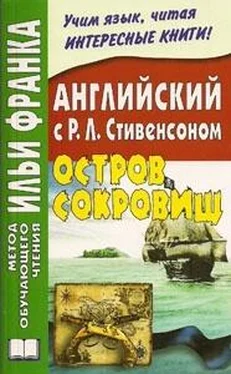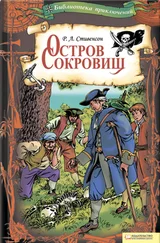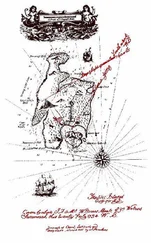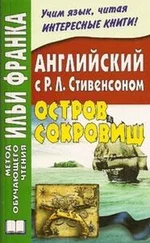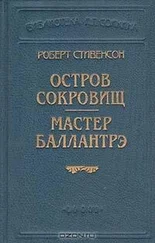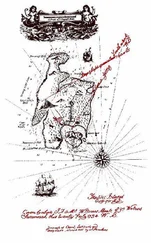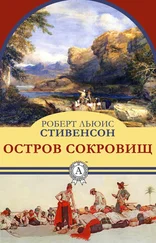“Marooned three years agone(брошен на острове три года назад) ,” he continued(он продолжил) , “and lived on goats since then, and berries, and oysters(и кормился: «жил на» козами с тех пор, и ягодами, и устрицами) . Wherever a man is, says I, a man can do for himself(где бы человек ни был, я говорю = думаю, он может позаботиться о себе; to do for oneself — справляться ) . But, mate, my heart is sore for Christian diet(но сердце мое истосковалось по /настоящей/ христианской = человеческой пище; sore — больной, опечаленный ) . You mightn’t happen to have a piece of cheese about you, now(у тебя случайно нет собой кусочка сыра) ? No(нет) ? Well, many’s the long night I’ve dreamed of cheese — toasted, mostly(так вот, много долгих ночей я видел сны о сыре — на ломтике хлеба, в основном) — and woke up again, and here I were(и просыпался вновь, а я вот здесь) .”
“If ever I can get aboard again(если я вообще сяду на корабль вновь = вернусь на корабль) ,” said I, “you shall have cheese by the stone(вы получите вот такую голову сыра; stone — мера массы, равная 6,35 кг ) .”
marooned [mq`rHnd] punishment [`pAnISmqnt] oyster [`OIstq] cheese [tSJz]
“Nay, mate,” said he — “marooned.”
I had heard the word, and I knew it stood for a horrible kind of punishment common enough among the buccaneers, in which the offender is put ashore with a little powder and shot, and left behind on some desolate and distant island.
“Marooned three years agone,” he continued, “and lived on goats since then, and berries, and oysters. Wherever a man is, says I, a man can do for himself. But, mate, my heart is sore for Christian diet. You mightn’t happen to have a piece of cheese about you, now? No? Well, many’s the long night I’ve dreamed of cheese — toasted, mostly — and woke up again, and here I were.”
“If ever I can get aboard again,” said I, “you shall have cheese by the stone.”
All this time he had been feeling the stuff of my jacket(все это время он ощупывал мою куртку; stuff — материал, вещество ) , smoothing my hands(гладил мои руки) , looking at my boots(смотрел на мои ботинки) , and generally, in the intervals of his speech(и вообще, в промежутках своей речи = замолкая) , showing a childish pleasure in the presence of a fellow-creature(показывал детскую радость в присутствии = по-детски радовался, что видит другого человека; fellow-creature — ближний, человек, собрат ) . But at my last words he perked up into a kind of startled slyness(но при моих последних словах он взглянул с каким-то тревожным лукавством; to perk up — оживиться, поднять голову ) .
“If ever you can get aboard again, says you(если тебе удастся вернуться на корабль, говоришь) ?” he repeated(он повторил) . “Why, now, who’s to hinder you(ну, а кто тебе может помешать) ?”
“Not you, I know(не вы, конечно) ,” was my reply(был мой ответ) .
smoothing [`smHDIN] childish [`tSaIldIS] slyness [`slaInIs] reply [rI`plaI]
All this time he had been feeling the stuff of my jacket, smoothing my hands, looking at my boots, and generally, in the intervals of his speech, showing a childish pleasure in the presence of a fellow-creature. But at my last words he perked up into a kind of startled slyness.
“If ever you can get aboard again, says you?” he repeated. “Why, now, who’s to hinder you?”
“Not you, I know,” was my reply.
“And right you was(ты был прав) ,” he cried. “Now you — what do you call yourself, mate(итак, ты — как ты себя называешь = как тебя зовут, приятель) ?”
“Jim,” I told him(сказал ему я) .
“Jim, Jim(Джим, Джим) ,” says he, quite pleased apparently(сказал он, явно вполне довольный) . “Well, now, Jim, I’ve lived that rough as you’d be ashamed to hear of(итак, Джим, я жил так, что тебе стыдно будет слушать об этом; rough — грубый, горький, суровый; to live rough — жить бедно, тяжело ) . Now, for instance, you wouldn’t think I had had a pious mother — to look at me(например, ты бы не подумал = не поверил, /что/ у меня была благочестивая мать, глядя на меня) ?” he asked.
“Why, no, not in particular(нет, не совсем; in particular — в частности, именно ) ,” I answered.
apparently [q`pxrqntlI] rough [rAf] for instance [fqr`Instqns] pious [`paIqs]
“And right you was,” he cried. “Now you — what do you call yourself, mate?”
“Jim,” I told him.
“Jim, Jim,” says he, quite pleased apparently. “Well, now, Jim, I’ve lived that rough as you’d be ashamed to hear of. Now, for instance, you wouldn’t think I had had a pious mother — to look at me?” he asked.
“Why, no, not in particular,” I answered.
“Ah, well,” said he, “but I had — remarkable pious(но у меня была — удивительно благочестивая /мать/) . And I was a civil, pious boy(а я был воспитанным набожным мальчиком) , and could rattle off my catechism that fast(и мог выпалить одним духом катехизис так быстро) , as you couldn’t tell one word from another(что ты не смог бы отличить одно слово от другого) . And here’s what it come to, Jim(и вот до чего дошло, Джим) , and it begun with chuck-farthen on the blessed grave-stones(а началось это с /игры/ в орлянку на проклятых надгробиях) ! That’s what it begun with, but went further’n that(вот как началось, но пошло дальше этого; further’n = further than — дальше чем ) ; and so my mother told me, and predicted the whole, she did, the pious woman(и так = что так будет моя мать говорила, и предсказала все, она, эта благочестивая женщина) ! But it were Providence that put me here(но это Провидение привело меня сюда) . I’ve thought it all out in this here lonely island(я все обдумал здесь, на этом одиноком острове) , and I’m back on piety(и я вернулся к благочестию = во всем раскаялся) . You don’t catch me tasting rum so much(ты не застанешь меня пробующим = пьющим ром так много = меня не соблазнить теперь выпивкой) ; but just a thimbleful for luck, of course(разве что глоточек: «наперсток» на счастье, конечно; thimble — наперсток ) , the first chance I have(при первом случае) . I’m bound I’ll be good, and I see the way to(я должен быть хорошим = исправиться, и я вижу путь к этому = и теперь не собьюсь с пути; to be bound — быть обязанным ) . And, Jim(и, Джим)” — looking all round him(оглядевшись вокруг себя) , and lowering his voice to a whisper(и понижая голос до шепота /произнес/) — “I’m rich(я богат) .”
Читать дальше
Конец ознакомительного отрывка
Купить книгу
